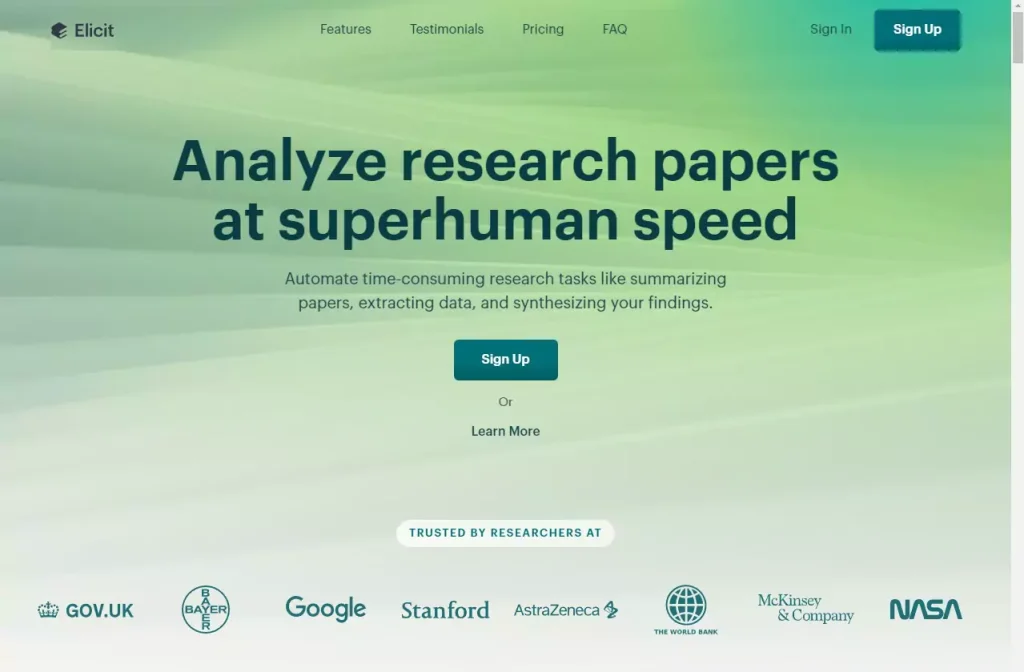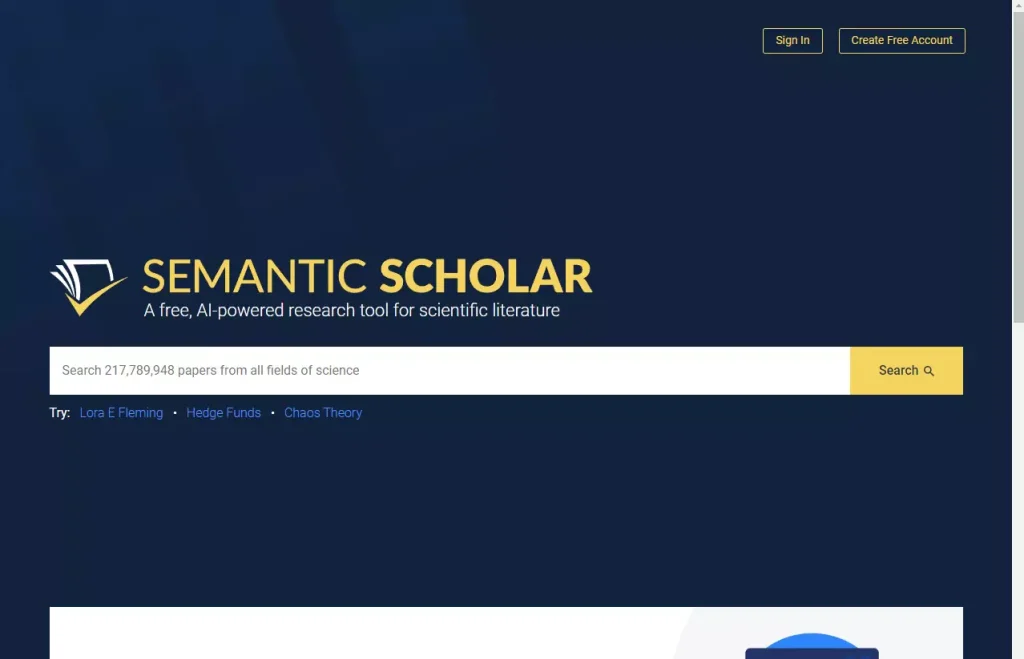Artificial intelligence (AI) is rapidly transforming the research landscape. From automating tedious tasks to uncovering hidden patterns in complex data, best AI research tools are empowering researchers to achieve groundbreaking results.
This blog post will equip you with a powerful arsenal of these tools, categorized to streamline your research workflow and maximize your impact.
Buckle up and get ready to explore the exciting world of AI-powered research!
- 1. Google Gemini Advanced: Unveiling the Cutting Edge
- 2. Scite: Sharpening Your Focus with AI-powered Research Analysis
- 3. Trinka: Elevating Your Academic Writing with AI-powered Polish
- 4. Elicit: Unearthing Insights with AI-powered Data Exploration
- 5. Scholarcy: Building Bridges Across the Research Landscape with AI-powered Collaboration
- 6. Unveiling the Power of IBM Watson: AI for Research Across Industries
- 7. Tableau: Unveiling the Power of Data Visualization for Research Impact
- 8. Semantic Scholar: Revolutionizing Research Discovery with AI-powered Search
- 9. Consensus: Building Bridges and Achieving Research Consensus with AI
- Conclusion: Empowered Research with Cutting-edge AI Tools
1. Google Gemini Advanced: Unveiling the Cutting Edge

Let’s kick off our exploration of best AI research tools with a powerful offering from Google: Gemini Advanced. This is a premium version of the widely-used AI model, Gemini, designed specifically to tackle complex research tasks.
What makes Gemini Advanced a standout lies in its capability to handle highly specialized research needs. Powered by Google’s most advanced AI model, 1.0 Ultra, Gemini Advanced excels at:
- Complex Reasoning: Uncover hidden connections and patterns within your data using Gemini Advanced’s sophisticated reasoning abilities.
- Nuanced Instruction Following: Provide intricate research queries, and Gemini Advanced will meticulously follow your instructions, ensuring precise results.
- Advanced Code Manipulation: Streamline your research by leveraging Gemini Advanced’s code-processing capabilities. It can analyze and generate code, automating tedious tasks and accelerating your workflow.
- Creative Research Collaboration: Foster groundbreaking ideas through brainstorming and idea generation with Gemini Advanced. It can act as a thought partner, suggesting new research avenues and approaches.
Who should consider Gemini Advanced? Researchers working on projects demanding high levels of computational power, intricate reasoning, and cutting-edge AI assistance will find Gemini Advanced an invaluable companion.
Availability: Access Gemini Advanced through the Google One AI Premium Plan. This plan offers a comprehensive suite of Google AI features, including 2TB of cloud storage, alongside the power of Gemini Advanced.
2. Scite: Sharpening Your Focus with AI-powered Research Analysis

Scite is another gem among best AI research tools, specifically designed to enhance your analysis of scholarly articles. Imagine having an intelligent research assistant readily available to dissect complex papers and extract key insights. That’s precisely what Scite offers.
Here’s how Scite empowers your research:
- Intelligent Literature Review: Scite utilizes AI to automate the literature review process. Effortlessly identify relevant research papers, analyze their citations, and grasp the overall landscape of your research topic.
- Enhanced Citation Analysis: Scite goes beyond basic citation counts. It delves deeper, unveiling the strengths and weaknesses of the cited research, allowing you to effectively evaluate the credibility and impact of your sources.
- Visualizing the Research Landscape: Scite generates compelling visualizations of the citation network surrounding your research topic. These visual aids uncover hidden connections between studies, facilitating a holistic understanding of the field.
Who should leverage Scite? Researchers wrestling with vast amounts of scholarly literature and needing sophisticated tools to navigate complex research areas will find Scite an invaluable asset.
Availability: Scite offers a freemium model. The free tier provides basic functionalities, while premium plans unlock advanced features like in-depth citation analysis and visualization tools.
3. Trinka: Elevating Your Academic Writing with AI-powered Polish

As we explore the best AI research tools, let’s shift focus to the crucial aspect of crafting a compelling research paper. Trinka is an AI-powered writing assistant specifically designed to enhance your academic writing.
How Trinka polishes your research writing:
- Advanced Grammar and Mechanics: Trinka goes beyond basic grammar checks. It identifies and corrects intricate grammatical errors often found in academic writing, ensuring your work adheres to the highest standards.
- Vocabulary Enhancement: Trinka suggests precise and sophisticated vocabulary choices, elevating the overall quality of your writing.
- Academic Tone and Style: Maintain a professional and objective tone throughout your research paper with Trinka’s guidance. It ensures your writing conforms to academic conventions.
- Conciseness and Clarity: Avoid redundancy and streamline your writing with Trinka’s suggestions. It helps you convey complex ideas with clarity and precision.
Who should consider Trinka? Researchers of all levels can benefit from Trinka’s expertise. Whether you’re a seasoned academic or a budding researcher, Trinka ensures your writing exhibits professionalism and clarity.
Availability: Trinka offers a freemium model. The free tier provides basic grammar checking and writing suggestions, while premium plans unlock advanced features like academic style correction and in-depth vocabulary enhancement.
4. Elicit: Unearthing Insights with AI-powered Data Exploration

Continuing our exploration of best AI research tools, let’s delve into Elicit. This tool empowers researchers to extract meaningful insights from large and complex datasets.
Elicit’s secret sauce lies in its ability to:
- Automated Data Exploration: Sifting through massive datasets can be a daunting task. Elicit automates this process, identifying patterns, trends, and anomalies within your data.
- Interactive Data Visualization: Elicit creates interactive visualizations of your data, allowing you to explore relationships between variables and gain deeper understandings.
- Hypothesis Generation: Elicit leverages AI to generate data-driven hypotheses, prompting new research questions and advancing your investigations.
Who should consider Elicit? Researchers working with large-scale datasets across various disciplines will find Elicit an invaluable tool. Whether you’re analyzing social science surveys, genomic data, or economic indicators, Elicit can unlock hidden insights within your data.
Availability: Elicit operates on a freemium model. The free tier provides basic data exploration functionalities, while premium plans offer advanced features like interactive visualizations and hypothesis generation.
5. Scholarcy: Building Bridges Across the Research Landscape with AI-powered Collaboration

Our journey through best AI research tools wouldn’t be complete without mentioning Scholarcy. This innovative tool focuses on fostering collaboration among researchers.
Scholarcy empowers research teams by:
- Intelligent Literature Search: Effortlessly identify relevant research papers using Scholarcy’s AI-powered search function. It analyzes your research topic and suggests highly pertinent articles to fuel your collaborative efforts.
- Streamlined Knowledge Sharing: Scholarcy provides a centralized platform for research teams to share articles, data, and findings. This facilitates seamless collaboration and information exchange.
- AI-powered Recommendation Engine: Scholarcy leverages AI to recommend experts in your field who might be valuable collaborators. This broadens your research network and opens doors to fruitful collaborations.
Who should leverage Scholarcy? Researchers working on complex projects that demand interdisciplinary approaches will find Scholarcy an invaluable tool. It promotes collaboration and knowledge sharing, leading to more comprehensive and impactful research.
Availability: Scholarcy offers a freemium model. The free tier provides basic literature search and collaboration features, while premium plans unlock advanced functionalities like AI-powered expert recommendations and in-depth collaboration metrics.
6. Unveiling the Power of IBM Watson: AI for Research Across Industries

Having explored some incredible niche-specific tools, let’s broaden our perspective with IBM Watson. As a behemoth in the AI world, Watson offers a comprehensive suite of best AI research tools applicable across diverse research fields.
What makes Watson stand out?
- Versatility: Watson’s modular design allows customization for various research disciplines. Whether you’re analyzing medical imaging data or conducting social science research, Watson can be tailored to your specific needs.
- Advanced Natural Language Processing (NLP): Watson excels at understanding and processing human language. This makes it ideal for research involving text analysis, sentiment analysis, and automated information extraction from large document collections.
- Machine Learning Expertise: Watson leverages cutting-edge machine learning algorithms to identify patterns and relationships within your data. This facilitates discovery of hidden insights and supports predictive modeling in your research.
Who should consider Watson? Researchers seeking a powerful and flexible AI platform will find Watson highly valuable. Its versatility makes it suitable for a wide range of research projects, from life sciences to economics and beyond.
Availability: IBM Watson operates on a tiered pricing model. The specific costs depend on the chosen features and computing power requirements.
7. Tableau: Unveiling the Power of Data Visualization for Research Impact

While not strictly an AI tool, Tableau deserves a mention among the best AI research tools for its exceptional data visualization capabilities. Research is all about effectively communicating your findings. Tableau empowers researchers to do just that by transforming complex data into compelling and insightful visualizations.
How Tableau bolsters your research impact:
- Effortless Data Storytelling: Tableau simplifies the creation of interactive charts, graphs, and dashboards. These visualizations transform raw data into engaging narratives that effectively communicate your research findings.
- Enhanced Audience Engagement: Complex data can be daunting for audiences. Tableau’s visualizations make your research more accessible and understandable to a wider audience, increasing the impact of your work.
- Data Exploration Made Easy: Tableau facilitates intuitive data exploration. You can easily manipulate your visualizations to uncover hidden patterns and trends within your data.
Who should leverage Tableau? Researchers across all disciplines can benefit from Tableau’s data visualization prowess. Whether you’re presenting your findings to a scientific conference or creating reports for policymakers, Tableau helps you effectively communicate your research story.
Availability: Tableau offers a freemium model with a limited feature set. Paid subscriptions unlock advanced functionalities and data handling capabilities.
8. Semantic Scholar: Revolutionizing Research Discovery with AI-powered Search

Our exploration of best AI research tools wouldn’t be complete without mentioning Semantic Scholar. This innovative tool transforms the research discovery process by leveraging the power of AI.
Semantic Scholar stands out thanks to:
- Intelligent Search: Ditch keyword-based struggles. Semantic Scholar utilizes natural language processing (NLP) to understand the intent behind your search queries. This results in more relevant and comprehensive search results.
- Relationships Unveiled: Semantic Scholar goes beyond simply listing research papers. It analyzes the relationships between studies, revealing the intellectual context of your research topic. This facilitates a deeper understanding of the field.
- Enhanced Scholar Profiles: Gain a holistic view of researchers’ work. Semantic Scholar showcases a scholar’s publications, citations, and areas of expertise, allowing you to identify leading researchers in your field.
Who should leverage Semantic Scholar? Researchers of all levels can benefit from Semantic Scholar’s sophisticated search functionalities. Whether you’re a seasoned academic or a budding researcher just starting out, Semantic Scholar can streamline your literature review process and help you discover groundbreaking research.
Availability: Semantic Scholar is a freely available online search engine specifically tailored for academic research.
9. Consensus: Building Bridges and Achieving Research Consensus with AI

Rounding out our exploration of best AI research tools, let’s delve into Consensus. This innovative tool tackles a unique challenge: fostering agreement and collaboration within research teams.
Here’s how Consensus leverages AI to empower research teams:
- Intelligent Conflict Resolution: Disagreements are inevitable in research. Consensus employs AI to analyze opposing viewpoints within a team and identify underlying areas of agreement. This facilitates constructive discussions and helps researchers reach a consensus.
- Structured Argument Mapping: Organize complex research debates with Consensus’s AI-powered argument mapping tool. It visually represents different viewpoints and their supporting evidence, promoting clear and focused communication.
- Prioritization and Decision-Making: Consensus utilizes AI to analyze research data and arguments, highlighting key points and potential areas of compromise. This empowers research teams to make informed decisions and prioritize effectively.
Who should consider Consensus? Research teams working on collaborative projects where reaching consensus on methodology, interpretations, or conclusions is critical will find Consensus invaluable. It promotes productive dialogue and efficient decision-making within research groups.
Availability: Consensus operates on a subscription basis. Pricing plans vary depending on team size and desired features.
Conclusion: Empowered Research with Cutting-edge AI Tools
The landscape of research is undergoing a transformative shift driven by artificial intelligence. This article explored a diverse arsenal of AI-powered tools, each designed to empower researchers at every stage of the research process. From tackling complex data analysis with Elicit to fostering collaboration with Scholarcy, these innovative tools offer significant advantages.
The key takeaway? AI is not here to replace researchers – it’s here to augment our capabilities. By strategically leveraging these tools, researchers can achieve groundbreaking results, accelerate discovery, and ultimately, make a lasting impact on their respective fields.
Remember, this conclusion emphasizes the collaborative and empowering nature of AI research tools. It also highlights the overall impact these tools can have on research outcomes.


